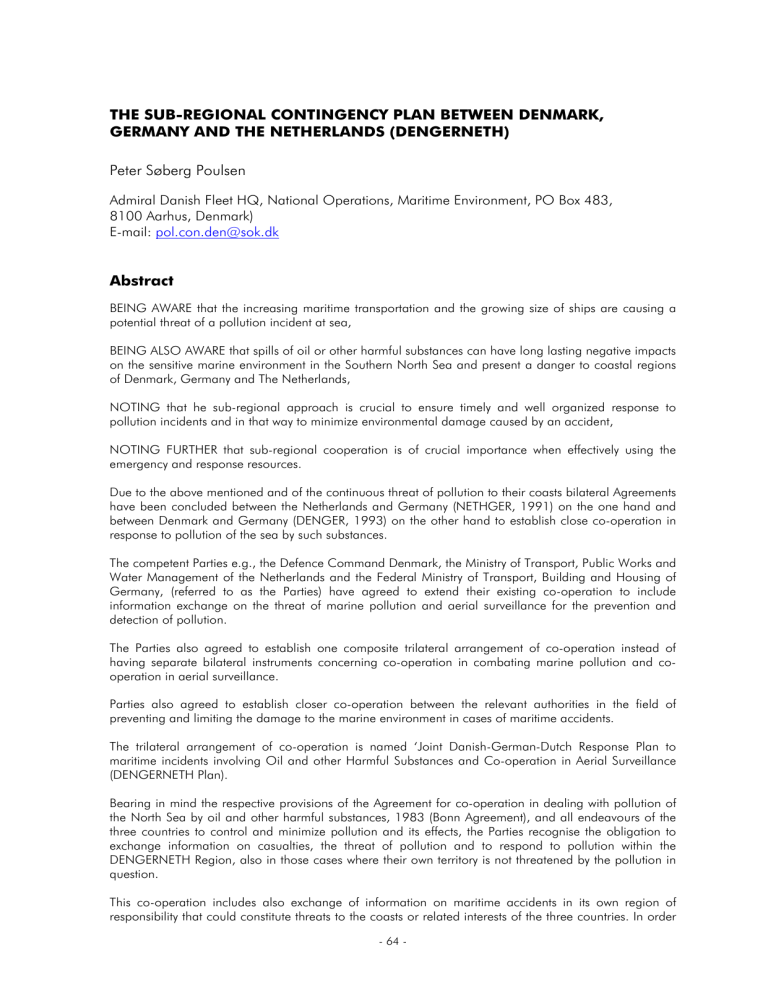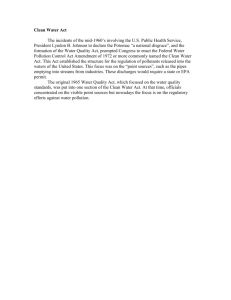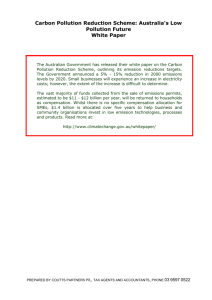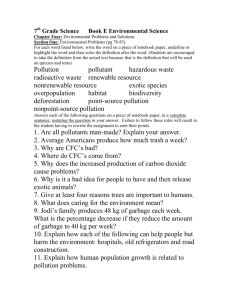Peter Søberg Poulsen THE SUB-REGIONAL CONTINGENCY PLAN BETWEEN DENMARK,

THE SUB-REGIONAL CONTINGENCY PLAN BETWEEN DENMARK,
GERMANY AND THE NETHERLANDS (DENGERNETH)
Peter Søberg Poulsen
Admiral Danish Fleet HQ, National Operations, Maritime Environment, PO Box 483,
8100 Aarhus, Denmark)
E-mail: pol.con.den@sok.dk
Abstract
BEING AWARE that the increasing maritime transportation and the growing size of ships are causing a potential threat of a pollution incident at sea,
BEING ALSO AWARE that spills of oil or other harmful substances can have long lasting negative impacts on the sensitive marine environment in the Southern North Sea and present a danger to coastal regions of Denmark, Germany and The Netherlands,
NOTING that he sub-regional approach is crucial to ensure timely and well organized response to pollution incidents and in that way to minimize environmental damage caused by an accident,
NOTING FURTHER that sub-regional cooperation is of crucial importance when effectively using the emergency and response resources.
Due to the above mentioned and of the continuous threat of pollution to their coasts bilateral Agreements have been concluded between the Netherlands and Germany (NETHGER, 1991) on the one hand and between Denmark and Germany (DENGER, 1993) on the other hand to establish close co-operation in response to pollution of the sea by such substances.
The competent Parties e.g., the Defence Command Denmark, the Ministry of Transport, Public Works and
Water Management of the Netherlands and the Federal Ministry of Transport, Building and Housing of
Germany, (referred to as the Parties) have agreed to extend their existing co-operation to include information exchange on the threat of marine pollution and aerial surveillance for the prevention and detection of pollution.
The Parties also agreed to establish one composite trilateral arrangement of co-operation instead of having separate bilateral instruments concerning co-operation in combating marine pollution and cooperation in aerial surveillance.
Parties also agreed to establish closer co-operation between the relevant authorities in the field of preventing and limiting the damage to the marine environment in cases of maritime accidents.
The trilateral arrangement of co-operation is named ‘Joint Danish-German-Dutch Response Plan to maritime incidents involving Oil and other Harmful Substances and Co-operation in Aerial Surveillance
(DENGERNETH Plan).
Bearing in mind the respective provisions of the Agreement for co-operation in dealing with pollution of the North Sea by oil and other harmful substances, 1983 (Bonn Agreement), and all endeavours of the three countries to control and minimize pollution and its effects, the Parties recognise the obligation to exchange information on casualties, the threat of pollution and to respond to pollution within the
DENGERNETH Region, also in those cases where their own territory is not threatened by the pollution in question.
This co-operation includes also exchange of information on maritime accidents in its own region of responsibility that could constitute threats to the coasts or related interests of the three countries. In order
- 64 -
to increase the effectiveness of the measures taken, the Danish, German and Dutch authorities agreed to act in accordance with the principles contained in the Plan.
For the purpose of this Plan joint operations include all operations involving co-operation, of whatever nature, between Denmark, Germany and The Netherlands pursuant to the objective of the Plan.
This Plan applies as necessary and appropriate to any marine pollution or threat of pollution within the
DENGERNETH Response Region, which is or could become of sufficient severity to initiate joint action.
Even when an incident provides for no imminent threat of pollution the Plan will initiate an information exchange. The exchange of information must not necessarily mean an activation of the DENGERNETH
Plan.
The Response Region
The southern part of the North Sea is considered as the Response Region.
The Response Region is divided into the national response zones of Denmark,
Germany and the Netherlands in accordance with Art. 6 of the Bonn Agreement. The lines of demarcation coincide with the National
Response Zones.
According to Art. 6 of the Bonn Agreement the
Party within whose zone the incident occurs, shall make the necessary assessments of the nature and inform the national contact points of the other Parties of its assessments and any action taken.
Fig. 1. Map of Responsibility in the North Sea
(DENGERNETH).
Quick Response Zones
Within the Response Region there are two areas of joint responsibility (Quick Response Zones): bilateral area ‘Denmark – Germany’ bilateral area ‘Germany – The Netherlands’
In a Quick Response Zone, immediate actions must take place in maritime accidents and each
Party has the right to start response actions immediately regardless in whose National Response
Zone the pollution has occurred.
- 65 -
On the landward side of the baseline (internal waters) joint combating actions only take place, if explicitly requested by the concerned Party.
The two Quick Response Zones link the agreed points of the EEZ boundaries to the coast.
Fig. 2. Map of Quick Response Zones in the North
Sea (DENGERNETH).
Special arrangements
The DENGERNETH Plan also applies to the Wadden Sea and the Eems-Dollard region.
Regional sub-plans for Wadden Sea areas may be concluded within the framework of this
DENGERNETH Plan. The agreement between the Federal Republic of Germany and the
Kingdom of the Netherlands concerning the arrangement of co-operation in the Eems Estuary of 8 April 1960 is not affected by this plan.
Activation of the plan
The DENGERNETH Plan is activated if one country asks the other Parties for assistance (call for assistance) in response to pollution of the sea by oil or other harmful substances. The other
Parties are to acknowledge the activation of the Plan.
The DENGERNETH Plan is also activated if one Party takes response measures in another
Party’s National Response Zone.
The DENGERNETH Plan may further be activated in case of pollution or serious threat of pollution outside the Response Region, if the situation calls for an urgent activation of the Plan in a case where the pollution or the threat of pollution could affect the Response Region. In this case the National Responsible Authorities of the Parties should in due course decide whether or not joint response actions are required.
Co-ordination and responsibility
In the Response Region the responsibility for initiating joint operations normally rests with that country in whose National Response Zone the incident has occurred. This country normally will be the Lead Country. The Lead Country will assume responsibility and co-ordinate any required assistance.
- 66 -
Governmental owned or operated equipment, vessels, operational forces and surveillance capacity of the three countries shall be made available for joint combating activities. The Lead
Country shall be assisted by the other Parties to arrange contacts with private companies, which have the appropriate equipment and/or operational forces available.
When the oil or other harmful substances enter into the National Response Zone of another
Party to the DENGERNETH Plan the responsibility of joint actions normally should be transferred to that Party.
In case of a pollution incident of which the source is known, the Lead Country will also coordinate legal and financial matters (claims) on behalf of the Parties.
There may be cases in which, as a result of a joint evaluation by the authorities of the three
Parties, the responsibility is left with the original Lead Country.
There may also be cases where the three Parties operate independently in their National
Response Zone, but continuously inform each other about their operations. This may occur for instance if pollution impacts more than one National Response Zone at the same time.
Response actions
All response actions under this Plan should be agreed between the Parties, unless the situation requires quick response activities. In a case where quick response activities are required, the operational forces of one Party may operate within the territorial waters of the neighbouring country, if these operational forces are first to arrive at the site of the pollution. Notification of the authorities of the Party affected should be made as soon as possible.
Especially in the case of pollution by harmful substances others than oil or loss of packaged dangerous goods, the assistance requesting Party shall specify the circumstances of the incident and the kind of assistance needed. The other Parties shall use their best endeavors to bring such assistance as is within their power taking into account the technological means available.
Aerial surveillance
For the purpose of detecting spills of oil or other hazardous substances which may be illegal according to international law, and for the purpose of registering spills of oil and other harmful substances likely to affect coastal regions or the environment of the North Sea, the parties agree, with reference to the Bonn Agreement, 1983 to intensify and to regulate co-operation regarding airborne surveillance between the respective competent authorities, according to the
Bonn Agreement procedures, by:
the establishment of surveillance areas of mutual interest;
the co-ordination of flight schedules;
standardisation of reporting and communication procedures;
standardisation of observation methods and registration formats;
the development and the effective use of airborne surveillance equipment;
the improvement of marine pollution combating actions especially in the implementation of the DENGERNETH Plan;
providing mutual assistance in case of failure of aircraft or if the own air surveillance system cannot be operated.
- 67 -
The National Responsible Authorities shall carry out the above-mentioned provisions in direct contact with each other. Each Party of the DENGERNETH Plan shall make available aircraft especially equipped for airborne surveillance in order to:
carry out regular surveillance flights in accordance with the jointly established flight Plan;
provide assistance on request during pollution combating operations and during overhaul of an other Parties aircraft.
Exercises
In order to establish a high degree of readiness, annual exercises shall be carried out between the three countries. Instead of these trilateral exercises or in addition, combined exercises in accordance with relevant regulations of the Bonn Agreement may be conducted.
The annual exercise programme shall be decided upon in January after trilateral consultations.
Within the framework of the DENGERNETH Plan two exercises have already been carried out.
Denmark, May 2005. The Netherlands, June 2006.
- 68 -






